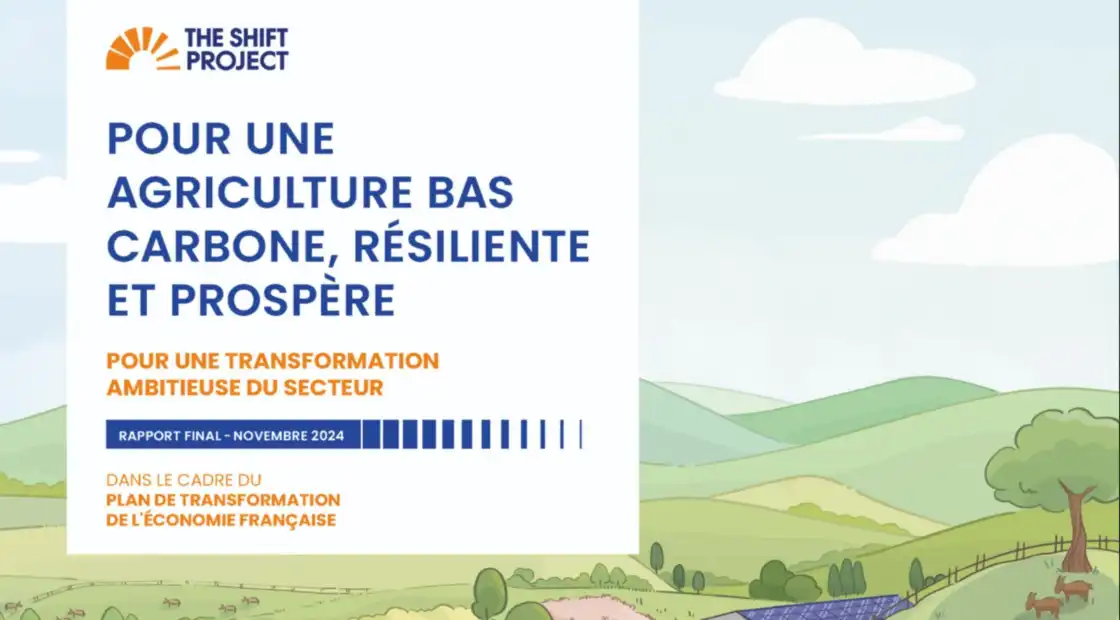Energy and climate: a transition to low-carbon, resilient agriculture

Analysis of the situation of the agricultural sector in the face of climate and energy challenges
This presentation, offered at SIVAL 2025, presented the work of the Shift Project on the transition of French agriculture towards a low-carbon and resilient model. The study is based on an inventory of the sector and a consultation of 7,700 farmers, in order to propose realistic and appropriate scenarios.
The Shift Project identifies a double carbon constraint weighing on agriculture: on the one hand, the need to reduce greenhouse gas emissions, and on the other, dependence on fossil fuels. At present, agriculture accounts for around 20% of national emissions, while being heavily dependent on oil and mineral nitrogen fertilizers produced from fossil gas.
The results of the study indicate that the specialization and simplification of farming systems have disrupted the circularity of flows, increasing the vulnerability of farms to climatic and economic shocks. The pressure on agricultural biomass, subject to growing conflicts of use, also represents a major challenge for the future viability of the sector.
Transition scenarios for 2050
The Shift Project has studied four transition scenarios for the agricultural sector, taking into account emission mitigation and resilience-building objectives. Three initial scenarios were developed according to specific priorities: food self-sufficiency, energy contribution and maintaining export capacity. However, none of these models met the target set by the Stratégie Nationale Bas Carbone.
A fourth scenario, known as the "conciliation" scenario, was then developed by integrating physical constraints and optimizing the necessary trade-offs between emissions reduction, self-sufficiency and energy production. This scenario enables a significant reduction in emissions, while guaranteeing France's food self-sufficiency and contributing to national energy production.
To achieve this transformation, five action levers have been identified: energy optimization with a 20% reduction in consumption, transition to decarbonized energies, changes in fertilization systems with a 70% reduction in the use of mineral nitrogen fertilizers, adjustments in livestock systems to limit methane emissions, and improved agricultural practices favoring carbon storage in soils and biomass.
Consultation results and recommendations for the future
The farmer consultation reveals a strong consensus on the sector's major concerns. Nearly 86% of those surveyed expressed concern about the impact of climate change on their farms. Rising energy prices and the effects of plant protection products on health also figure among farmers' major concerns.
The results also show a willingness to adopt more sustainable practices. Over 80% of farmers surveyed say they are ready to implement changes if the economic conditions are right. However, the main obstacles to this transition remain financial and regulatory.
The study's recommendations stress the need for economic and political support to enable this transition. Several priority actions are highlighted: clarification of strategic objectives for agriculture at national level, implementation of incentive rather than punitive policies, and better distribution of farm income within agri-food Sectors .
Transforming agriculture towards a low-carbon, resilient model requires concerted action by all players in the sector. Farms, local authorities and political decision-makers all have a key role to play in ensuring a sustainable future for French agriculture.
STAKEHOLDERS
Laure LE QUERE: Agriculture expert engineer - SHIFT PROJECT